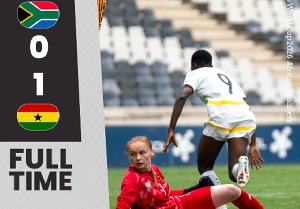Ghana Telecom, (GT) and Western Telesystems (Westel) are on the warpath with Scancom Limited, operators of Spacefon, for allegedly routing international outbound calls without a license, leading to a loss of about $2 million to the two companies.
Investigations have revealed that the two companies are aggressively pursuing a complaint against Scancom at the National Communication Authority (NCA), requesting for compensation in respect of the alleged illegality and a sanction on Scancom to desist from what Westel described as "dishonest, illegal practices".
The Chronicle has gathered that Westel is seeking $995,423,000 compensation in loss of revenues for the months of October and November 2003 and interest on such damages at the prevailing bank rate.
Ghana Telecom sources also told The Chronicle that their beef with Scancom was the same as that of Westel and that they would also be claiming compensation to the tune of about $810,650, representing losses for the month of November 2003 alone.
Speaking in an interview with The Chronicle, the Managing Director of Spacefon, Mr. Ahmad Farroukh, said that all the allegations levelled against his company were false and without basis and that as far they were concerned, these complaints were just an attempt to frustrate Scancom's application for a Gateway License.
According to him, the Government of Ghana, acting through Mr. Felix Agyepong, has since February 2001 canceled the duopoly which existed in the country as far as the operation of the gateway by Westel and GT was concerned. He added that all Westel was doing in the country was routing phone calls and earning hard currency.
The Legal representative of Spacefon, Mr. Benson Nutsukpui also said Westel had a very small clientele and depended heavily on Spacefon for international traffic fees and that Westel felt threatened by Spacefon's application for gateway license.
He added that Westel had been slapped with a $25 million penalty for their inability to reach the 50,000 subscription agreed with the government in 1995 for which reason they were awarded the monopoly. He declared Westel's clientele was below three thousand.
In December 1996, Ghana Telecom and Westel were awarded IDD international gateway licenses by the National Communication Authority NCA. This meant that all inbound and outbound international telecommunication traffic were to be routed through either GT or Westel.
But GT and Westel were unanimous in their claim and convinced that Scancom had been pulling a fast one on them as far as international traffic was concerned.
The Managing Director for Spacefon on the hand, told The Chronicle that they had stopped using Westels's services because they were over charging them.
He said whereas GT charged ?250 on all outbound calls, Westel uped their charges to ?6,500 . Mr. Farroukh also said Spacefon currently only used the services of GT.
But both Westel documents and GT representatives, at the beginning of March 2002, unveiled that international outbound traffic passing through their gateways originating from Spacefon's network, took a drastic downward trend.
They added that the decrease occurred during a period when the respondents were rather experiencing a robust subscriber growth.
According to documents obtained by The Chronicle, the two gateways maintained that further analysis of the combined traffic recordings from the Westel and GT showed declines in the total volume of outbound international traffic from Scancom during July 2002-March 2003.
Westel indicated in their complaint against Scancom that, " This analysis further strengthened their suspicions of the two international licensed gateway operators that Scancom was illegally routing traffic through an unlicensed gateway".
According to Westel, the analysis for the period of July 2002 to March 2003 highlighted the following trends, which they described as unusual. " July 2002, Total outbound traffic fell by 18%, August 2002 to December 2002, total inbound international traffic stagnated, September 2002, Total international outbound traffic fell by 75%, March, 2003, Total International outbound traffic increased by 320%, March 2003, Total inbound traffic increased by 66%"
Based on this data, The Chronicle gathered that from November 2003 to December 2003, Westel and GT began their own investigations.
The two gateway operators placed calls from multiple carriers within the United States and Europe to Spacefon's network. These calls, according to their investigation, were documented by independent sources as well as GT and Westel.
The complaint filed by Westel confirmed these investigations and stated that, "The test calls were cross - checked against the Calls Detailed Records (CDR's) of Westel and GT and the result showed that only 27% of the test calls made were routed via either Westel or GT's gateway, confirming suspicions of respondent's (Scancom) illegal by-pass."
Mr. Nutsukpui told The Chronicle that they could not accept the results of the joint investigations because they were not part of it. He wondered why the two operators left out Spacefon in the investigations since in the past they had done these investigations together.
In their explanation of how calls are tracked, Westel said, all telecommunication-switching systems produced Call Detailed Records (CDR's) which exist for every call routed into a switching platform, regardless of whether the call was completed or not. The CDR files, according to Westel, were regularly audited for validity and consistency by internal revenues assurance programs.
It was with these records that the network whose calls were routed through a particular gateway, charged their fees for routing the calls. Telecom experts explained that if the allegations of by-pass by Spacefon was indeed true, then Spacefon would skip all the fees it would have paid to the two gateway operators.
Even though it was not stated in the complaints of the Gateway operators, Chronicle has learnt that as many as a thousand test calls were made by the GT and Westel and that some of the investigations were conducted before the Parliamentary Select Committee of Communications.
On November19, 2003, Westel fired at the NCA, accusing Scancom of illegality and requesting NCA to take action against them. Headed "Bypass International Traffic Activities by Scancom", Westel directly accused the operators of Spacefon of illegally routing international traffic through an unlicensed international gateway.
Chronicle gathered that on November 26, 2003, the NCA invited both Westel and Scancom to meet and discuss the allegations but Westel, by a letter dated November27, 2003, declined the invitation on the grounds that they did not think it was appropriate for Scancom to be present at the meeting at that stage of the enquiry.
On December 1, 2003, the NCA issued another request, inviting Westel to meet and discuss the allegations against Scancom on December 4, 2003. This time, Westel honored the invitation.
"At that meeting, NCA produced a letter from the respondent and dated December 3, 2003, denying that it was illegally routing its international gateways and claiming the claimant's allegations were scurrilous and unfounded" said Westel.
Both Westel and GT said they had the evidence to nail Scancom to illegality and that they were willing to substantiate all the allegations made against Scancom. Westel is of the opinion that there is little hope for an amicable settlement of the dispute.
It must be noted that at the time when Westel and Scancom were trading these allegations, GT hadn't filed their complaints yet. Now the two gateway operators were jointly pursuing the case against Scancom.
The two gateways were similarly requesting that the NCA invoked its powers under Sections 2 (d) 3 (b), 3 (i) and 24 (1) (b) to perform all the necessary searches, investigations or the other procedures to obtain a full accounting of all the relevant information within Scancom's domain.
Aside the $995,423 compensation being sought by Westel, they were also praying the NCA to revise these figures when their investigations were complete. Westel was also asking the NCA to cease and desist from its illegal by-pass operations.
They were also asking the NCA to sanction Scancom for its "dishonest" practices and order the respondent (Scancom) to pay all of the costs incurred by the claimant in investigating and settling this dispute.
Mr. Farroukh said GT had not even submitted their traffic data to them for reconciliation as was usually the case.
Business News of Thursday, 25 December 2003
Source: Chronicle












